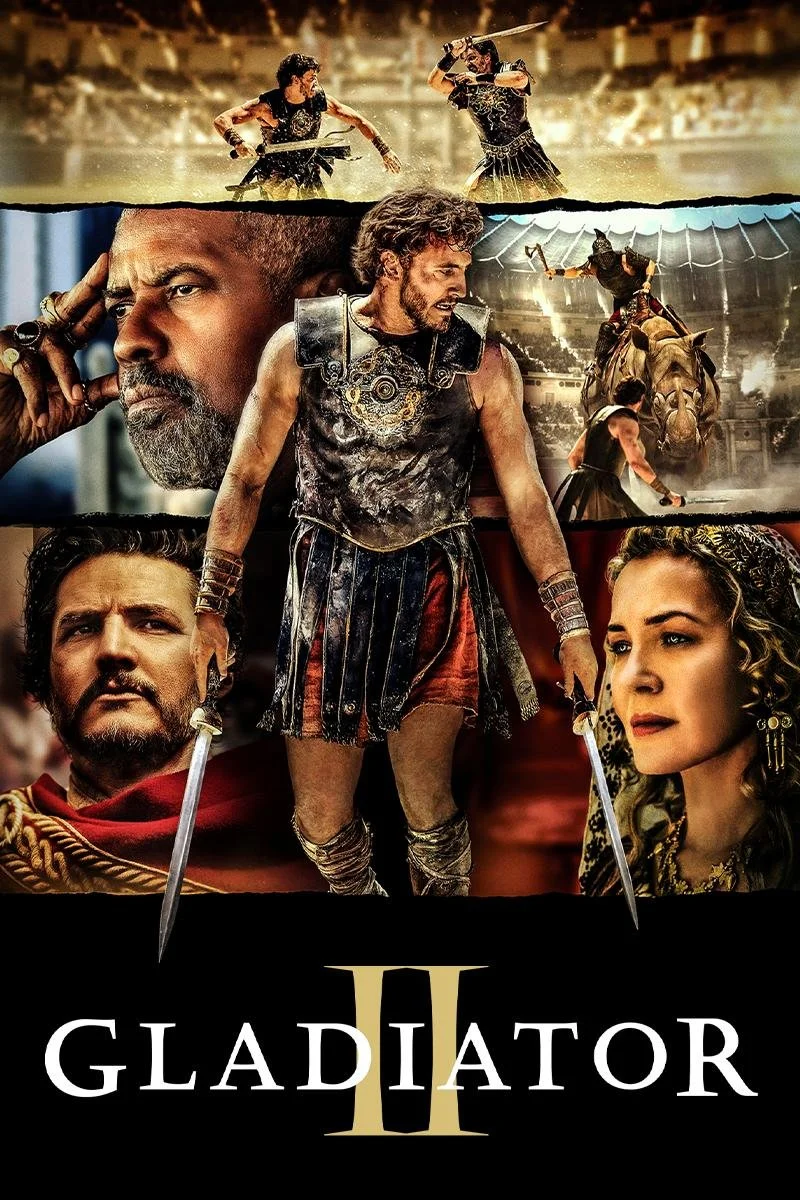“Gladiator II” - Film Review
Twenty-four years after Russell Crowe stepped into the arena to fight for a new Rome, director Ridley Scott has taken audiences back to the Colosseum in Gladiator II for another bloody battle. Scott’s recent outings have received mixed to negative reviews, but Gladiator II is Scott in his finest form. A bombastic sequel that takes Rome to a whole new level, Gladiator II is bigger, bloodier, and angrier, and it’s all grounded by Paul Mescal’s sensitive, steely performance.
Set sixteen years after the events of Gladiator, Gladiator II sees a Rome divided under the rule of twin emperors Geta (Joseph Quinn) and Caracalla (Fred Hechinger), who are reveling in the opulence their status brings. General Marcus Acacius (Pedro Pascal) has just conquered Numidia, but is beginning to feel guilt for his part in Rome’s never-ending quest for power. Lucius Verus (Paul Mescal) is enslaved by the Roman army and selected to become a gladiator by Macrinus (Denzel Washington), a mentor to gladiator-hopefuls. Lucius is adamant that he will not fight in the name of Rome or Macrinus, but when Macrinus offers him the chance to seek revenge on Acacius, Lucius agrees to enter the Colosseum.
courtesy of paramount
Every sequel, reboot, prequel, and return to a familiar intellectual property must answer the question of “why now?” Why return to this story at this particular moment in time? In the case of Gladiator II the answer is obvious, as the political storyline closely mirrors that of the current American climate. There is a once-great United States that some believe we must return to, but it’s one rooted in hatred and seeks only to make the rich richer. It’s the same as the Rome we see in Gladiator II, one that is fraught with tension and can be toppled by an individual who wants their own piece of the power. There are a few people who believe in the potential of a better Rome in the sequel. One such believer asks, “dare we rebuild that dream together?” They see a future that can be created by community and not bratty rulers.
courtesy of paramount
What Scott does best is all-out spectacle in the vein of classic Hollywood movies with hundreds of extras and massive set pieces. Who wouldn’t want to watch a gladiator fight a rhino or a pack of wild monkeys? The water sequence in the Colosseum is thrilling, but also ridiculous in the way these kinds of scenes should be. The logistics of flooding the Colosseum and transporting sharks to swim in that water is absurd in the best way. Historical accuracy has no business here. Nor should it. Gladiator II, unlike Scott’s Napoleon, never claimed to be a truthful recounting of life in Ancient Rome. Instead, it’s simply playing in the sandbox of the times of the gladiators, balancing an emotional core with vicious battles.
Mescal is the emotional heartbeat of Gladiator II. The film marks his leap from indie movies to blockbusters and it’s immediately clear that he’s as at ease in a Colosseum battle as he is in a small, melancholy story. Mescal has a captivating way about him and it makes even the largest scenes feel like they’re playing out on a personal level. His eyes continuously search for those of his scene partners’, exuding a feeling of being ever-present. On the other end of the spectrum is Washington, who has likely never had this much fun before. His Macrinus is ruthlessly self-interested and five steps ahead of everyone around him. Washington enjoys being one of the bad guys, chewing the scenery like it’s the best meal he’s ever eaten.
Gladiator II doesn’t need to scream “are you not entertained” because it knows we are. Gladiator II delivers exactly what you want from a blockbuster.
support your local film critic!
~
support your local film critic! ~
Beyond the Cinerama Dome is run by one perpetually tired film critic
and her anxious emotional support chihuahua named Frankie.
Your kind donation means Frankie doesn’t need to get a job…yet.
Follow me on BlueSky, Instagram, Letterboxd, & YouTube. Check out Movies with My Dad, a new podcast recorded on the car ride home from the movies.


